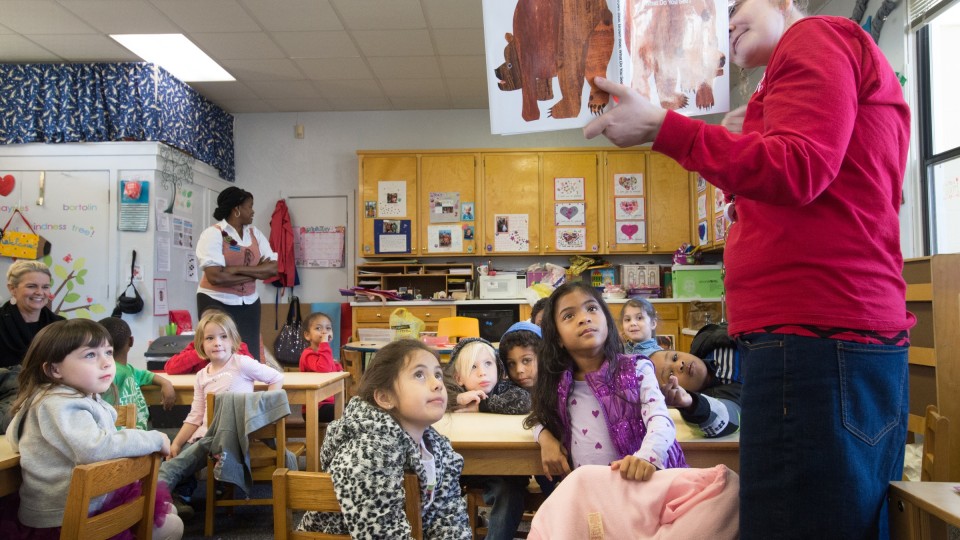Teachers, advocates question readiness test
- February 25, 2016
- / Shannon Nickinson
- / education

Heather Haynes reads to her class at T.R. Jackson Pre-K center Thursday February 11, 2016 in Milton, Florida. (Michael Spooneybarger/ CREO)
One of the key people who advocated to create the state's free voluntary prekindergarten system has deep questions about how the state could be calculating kindergarten readiness.
David Lawrence Jr. is chairman of the board of the Children's Movement of Florida, a nonpartisan group that works in the state to improve early education options for children. In 2002, he worked on the effort to pass a constitutional amendment to make VPK available for all 4-year-olds.
In an email to supporters he raised concerns about the way the Florida Department of Education may use data from kindergarten readiness tests from this school year to determine how ready for school our children are.
According to 2013 data, the most recently available data analysis from the Florida Office of Early Learning, 66 percent of Escambia County's 5-year-olds were ready for kindergarten. Since then the state has changed the way kindergarteners are evaluated for readiness and no new "kindergarten readiness" rate has been publicly released.
That change led Lawrence to send this:
We know that Floridians love their pre-K. How much? We invest almost $400 million a year, and 77 percent of all 4 year olds are enrolled. That’s the good news. But here, in the words of the late Paul Harvey, is “the rest of the story.” High enrollment is not enough; Floridians deserve to know about the return on their massive investment. That is, are children learning? (We know for a fact that only high quality brings real results.)
To measure learning gains, a kindergarten screening is given to kindergarten students early in the school year. What is learned leads to a “readiness rate” for pre-K providers. Those providers who do not meet the minimum rate set by the State Board of Education are placed on probation.
Last year there was no assessment of the simply vital early literacy skills. No readiness rate was calculated. This year readiness rates are headed toward being calculated with very incomplete data. Should those rates become final, most of the 1,200 low-performing providers will be removed from probation. That means no accountability tied to early reading skills or for the public investment of hundreds of millions of dollars. That’s lousy public policy.
Do not let this happen. Please contact your legislators and Governor Scott and tell them:
1. Do not calculate a readiness rate without information on VPK students’ early literacy skills.
2. Require the Department of Education to include a measure of early literacy skills in kindergarten.
Thanks.
Dave Lawrence Chair
The Florida Kindergarten Readiness Screener (FLKRS) is the umbrella term for a series of tests that over 10 years have been used to measure whether 5-year-olds are ready for school. FLKRS itself isn't a test — it's an acronym for whatever test is used at the time to measure readiness for school and evaluate the VPK providers in a community.
From 2010 to 2013, the FLKRS had two parts — Florida Assessments for Instruction in Reading (FAIR) and Work Sampling System given in the first 30 days of the school year by kindergarten teachers.
Starting in 2014, FAIR went from two to six parts: alphabetics, (phonological awareness, letter sounds); oral language (vocabulary pairs and following directions); comprehension (listening comprehension and sentence comprehension).
Work Sampling is portfolio-based and includes on observation by the teacher, includes samples of a child’s work, and physical, social, and emotional developmental markers. Children can be scored “not yet,” “in progress” or “proficient.”
In 2014 school districts across the state reported big problems with FAIR, which went to an all electronic format. Students and teachers both had to wear headphones to do the test together, which meant districts had to pay for substitutes to cover the classroom during testing.
Some districts reported problems accessing the system to upload the data, and ultimately the state dropped FAIR and no readiness rates were publicly issued that school year.
Work Sampling was the only test used this year to gauge kindergarten readiness and the effectiveness of the 90 prekindergarten programs in Escambia County.
Based on preliminary results given to the Early Learning Coalition of Escambia County, which oversees VPK providers, nearly 90 percent of this year's kindergarteners were "kindergarten ready," according to Bruce Watson, the coalition's executive director.
“I find it hard to believe that our children are doing that much better,” Watson says.
The state Board of Education will meet on March 29 to discuss whether to publicly release the readiness data calculated for 2015.
VPK providers have received their data, and Watson says it shows there are no providers with a readiness rate below 70 percent — the threshold a center must meet or be dubbed a “low performing provider” and face probationary sanctions.
In 2013, there were 23 low performing providers of VPK in Escambia County.
Escambia County isn't the only county eyeing these preliminary numbers with skepticism. The Florida Times Union reported on Feb. 24, that Duval County Early Learning Coalition officials are wary of a similar jump in their readiness rate based on the preliminary data their providers have received.
Dawn Alt is former principal of Oriole Beach Elementary School and now is director preschool programs for Santa Rosa County.
She too has concerns about the Florida Kindergarten Readiness Screener that stem from the delay between the time the child takes the test and when the results were returned by the state to schools and teachers.
“(Santa Rosa Superintendent Tim) Wyrosdick used to say to, "Dawn, you can't look at it like that." He's right. Everybody in this whole state is taking that same thing at the same time of year, but that doesn't keep me from thinking, I want to know the validity of it though.
“If you're going to tell me something about my children, I've got to know it's valid.”
Lee Bott, parent family community engagement specialist, at TR Jackson and husband of a kindergarten teacher, said there is another issue.
The state has all these new assessments that are done on the computer. In school readiness, the assumption is that children come to kindergarten knowing how to use a computer with a mouse.
“The truth is, most kindergartners know how to use a tablet device,” Bott says. “They don't know how to use a mouse and keyboard.
“You have the validity issue because these kids don't really know how to use the device that's in front of them and to them, success is going to the next screen, so they can click whatever. It does not tell them anything about where they really are.”

 CivicCon launches with a look at good growth in cities
CivicCon launches with a look at good growth in cities
 Building stronger brains one baby, one parent at a time
Building stronger brains one baby, one parent at a time
 SCI debuts commercial on Early Learning City
SCI debuts commercial on Early Learning City
 Entrecon: World class speakers and an opportunity to sharpen skills
Entrecon: World class speakers and an opportunity to sharpen skills
 PYP Quality of Life survey 2017
PYP Quality of Life survey 2017
 EntreCon Pensacola 2016: A look back
EntreCon Pensacola 2016: A look back
 Leadership tip: getting better employee takeaways
Leadership tip: getting better employee takeaways
 Leadership tip: be interested instead of interesting
Leadership tip: be interested instead of interesting
 Leadership tip: delivering difficult messages
Leadership tip: delivering difficult messages
 Brain Bags boost Arc, Early Childhood Court programs
Brain Bags boost Arc, Early Childhood Court programs